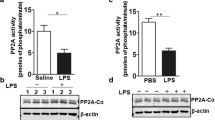Abstract
Background
The present study was designed to investigate the function of death-associated protein kinase 1 (DAPK1) in infantile pneumonia and explore the potential mechanism of the actions.
Objective
Male C57BL/6 mice were injected with 2 mg/kg of LPS for the mice model of infantile pneumonia. A549 cells were treated with 100 ng/ml of LPS for vitro model of infantile pneumonia. Dapk1 mRNA and protein expressions in 6, 12 or 24 h after induction model of mice.
Results
Dapk1 gene increased inflammation in vitro model through activation of p38MAPK-mediated NF-κB expression. The inhibition of p38MAPK or NF-κB reduced the pro-inflammation effects of DAPK1 in infantile pneumonia.
Conclusions
Our study demonstrates that Dapk1 promoted inflammation of infantile pneumonia by p38MAPK/NF-κB signaling pathway, may be achieved inflammation by activation of p38MAPK/NF-κB signaling pathway.







Similar content being viewed by others
References
Acchioni C, Remoli AL, Marsili G et al (2019) Alternate NF-κB-independent signaling reactivation of latent HIV-1 provirus. J Virol. https://doi.org/10.1128/JVI.00495-19
Arko-Boham B, Owusu BA, Aryee NA et al (2020) Prospecting for breast cancer blood biomarkers: death-associated protein kinase 1 (DAPK1) as a potential candidate. Dis Mark 2020:6848703
Bai D, Cong S, Zhu LP (2017) Attenuation of focal adhesion kinase reduces lipopolysaccharide-induced inflammation injury through inactivation of the Wnt and NF-κB pathways in A549 cells. Biochemistry 82:446–453
Bai D, Han A, Cong S (2018) The effect of down-regulation of CCL5 on lipopolysaccharide-induced WI-38 fibroblast injury: a potential role for infantile pneumonia. Iran J Basic Med Sci 21:449–454
Daniunaite K, Sestokaite A, Kubiliute R et al (2020) Frequent DNA methylation changes in cancerous and noncancerous lung tissues from smokers with non-small cell lung cancer. Mutagenesis 35:373–379
Guo J, Cheng Y (2018) MicroRNA-1247 inhibits lipopolysaccharides-induced acute pneumonia in A549 cells via targeting CC chemokine ligand 16. Biomed Pharmacother 104:60–68
Guo S, Bao L, Qu T et al (2018) Ameliorative effects of infantile feire kechuan oral solution on mycoplasma pneumoniae pneumonia in infant mouse and rat models. Evid Based Complement Altern Med 2018:8139040
Guo T, Su Z, Wang Q et al (2019) Vanillin protects lipopolysaccharide-induced acute lung injury by inhibiting ERK1/2, p38 and NF-κB pathway. Future Med Chem 11:2081–2094
Hyvärinen M, Piippo-Savolainen E, Korhonen K, Korppi M (2005) Teenage asthma after severe infantile bronchiolitis or pneumonia. Acta Paediatr 94:1378–1383
Kang W, Shang L, Wang T, Liu H, Ge S (2018) Rho-kinase inhibitor Y-27632 downregulates LPS-induced IL-6 and IL-8 production via blocking p38 MAPK and NF-κB pathways in human gingival fibroblasts. J Periodontol 89:883–893
Lee KH, Yeh MH, Kao ST et al (2009) Xia-bai-san inhibits lipopolysaccharide-induced activation of intercellular adhesion molecule-1 and nuclear factor-kappa B in human lung cells. J Ethnopharmacol 124:530–538
Li S, Cui W, Song Q, Zhou Y, Li J (2019) miRNA-302e attenuates inflammation in infantile pneumonia though the RelA/BRD4/NF-κB signaling pathway. Int J Mol Med 44:47–56
Li T, Wu YN, Wang H, Ma JY, Zhai SS, Duan J (2020) Dapk1 improves inflammation, oxidative stress and autophagy in LPS-induced acute lung injury via p38MAPK/NF-κB signaling pathway. Mol Immunol 120:13–22
Liu Q, Yang H, Xu S, Sun X (2018) Downregulation of p300 alleviates LPS-induced inflammatory injuries through regulation of RhoA/ROCK/NF-κB pathways in A549 cells. Biomed Pharmacother 97:369–374
Liu X, Zhao P, Ge W (2019) Knockdown of circular RNA circZNF652 remits LPS-induced inflammatory damage by regulating miR-181a. BioFactors 46:1031–1040
Quan B, Zhang H, Xue R (2019) miR-141 alleviates LPS-induced inflammation injury in WI-38 fibroblasts by up-regulation of NOX2. Life Sci 216:271–278
Shin WH, Chung KC (2020) Death-associated protein kinase 1 phosphorylates α-synuclein at Ser129 and exacerbates rotenone-induced toxic aggregation of α-synuclein in dopaminergic SH-SY5Y cells. Exp Neurobiol 29:207–218
Tomari K, Morino S, Horikoshi Y (2018) Case of infantile legionella pneumonia after bathing in reheated and reused water. Pediatr Infect Dis J 37:370–372
Wang S, Su H, Feng P et al (2020) Loss of death-associated protein kinase 1 in human bone marrow mesenchymal stem cells decreases immunosuppression of CD4+ T cells. J Int Med Res 48:300060520933453
Wu B, Yao H, Wang S, Xu R (2013) DAPK1 modulates a curcumin-induced G2/M arrest and apoptosis by regulating STAT3, NF-κB, and caspase-3 activation. Biochem Biophys Res Commun 434:75–80
Wu YH, Chou TF, Young L et al (2020) Tumor suppressor death-associated protein kinase 1 inhibits necroptosis by p38 MAPK activation. Cell Death Dis 11:305
Xie F, Yang L, Han L, Yue B (2017) MicroRNA-194 regulates lipopolysaccharide-induced cell viability by inactivation of nuclear factor-κ B pathway. Cell Physiol Biochem 43:2470–2478
Zuo J, Dou DY, Wang HF, Zhu YH, Li Y, Luan JJ (2017) Reactive oxygen species mediated NF-κB/p38 feedback loop implicated in proliferation inhibition of HFLS-RA cells induced by 1,7-dihydroxy-3,4-dimethoxyxanthone. Biomed Pharmacother 94:1002–1009
Acknowledgements
Not applicable.
Author information
Authors and Affiliations
Contributions
WZ: guarantor of integrity of the entire study, study concepts and design, definition of intellectual content, clinical studies, manuscript review; WZ: study design, literature research, experimental studies, data acquisition and analysis, statistical analysis, manuscript preparation; WZ: experimental studies; WZ: data acquisition and analysis; WZ: manuscript preparation and editing.
Corresponding author
Ethics declarations
Conflict of interest
There are no potential conflicts of interest to disclose.
Ethical approval
This study was approved by the Ethics committee of the Affiliated Changzhou NO.2 People’s Hospital of Nanjing Medical University.
Informed consent
All patients have given their written informed consent.
Additional information
Publisher's Note
Springer Nature remains neutral with regard to jurisdictional claims in published maps and institutional affiliations.
Rights and permissions
About this article
Cite this article
Zhang, W. Dapk1 promoted inflammation of infantile pneumonia by p38MAPK/NF-κB signaling pathway. Mol. Cell. Toxicol. 17, 297–304 (2021). https://doi.org/10.1007/s13273-021-00136-7
Accepted:
Published:
Issue Date:
DOI: https://doi.org/10.1007/s13273-021-00136-7




